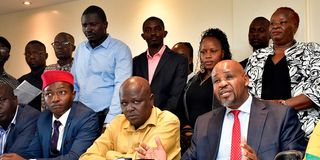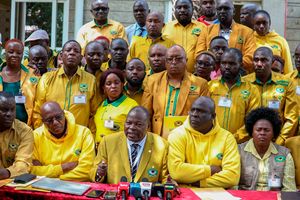
Kenya Union of Post Primary Education Teachers (Kuppet) Deputy Secretary General Moses Nthurima (right) gestures during a media briefing at Hill Park Hotel on March 25, 2025. With him is Junior Secondary School (JSS) Teachers National Spokesperson Omari Omari (left) and Kuppet National Vice Chairman Julius Korir.
Barely two weeks after a long running battle over constitutional amendments within the Kenya Union of Post Primary Education Teachers (Kuppet) seemed to settle, a fresh legal challenge has thrown the matter into turmoil.
The Employment and Labour Relations Court (ELRC) has issued an injunction suspending the implementation of the amended Kuppet constitution just days after it was controversially registered by Acting Registrar of Trade Unions Ann Kanake.
Mr Anthony Kinyua, a teacher and union member, obtained the court orders after filing a petition at the High Court in Nyeri.
He argues that the amendments were unconstitutional, illegal and void due to irregularities in their adoption.
Mr Kinyua contends that the process lacked transparency, public participation and fairness.
He is seeking a court directive compelling Kuppet’s secretary-general to conduct a fresh, transparent and inclusive amendment process in line with the union’s constitution, the Labour Relations Act and the Constitution of Kenya.
Additionally, he wants the court to declare that the Registrar acted unfairly and in violation of Article 47 of the Constitution by approving the amendments despite acknowledging strong objections.
Ms Kanake had issued a certificate of registration for the amended constitution on March 13, 2025, a move initially thought to have resolved the two year standoff between union officials and members across Kenya’s 47 counties.
However, the legal challenge has reignited tensions.
“It is certified that the foregoing alteration of the constitution of the Kenya Union of Post Primary Education Teachers has been registered pursuant to Section 27 of the Labour Relations Act,”Ms Kanake stated in the certificate.

Kuppet Secretary-General Akelo Misori addresses the media flanked by other officials in Nairobi on August 25, 2024.
Following the registration, Acting Secretary-General Moses Nthurima in a letter dated March 14, 2025, informed members that the changes would take effect from January 1, 2026.
However, Justice Onesmus Makau of the ELRC in Nyeri has now issued a stay order halting the implementation of the amendments until the case is heard and determined.
"Take notice that any disobedience or non-observance of the order of the court served herewith will result in penal consequences," Justice Makau warned in his ruling on March 25, 2025.
The case will be mentioned on April 4, 2025.
One of the most controversial amendments is the increase in the retirement age for top officials to 65 years. Additionally, the nomination fees for candidates seeking union positions have been significantly increased.
Candidates for national positions will now be required to pay between Sh300,000 and Sh500,000, while those vying for branch-level positions will pay between Sh100,000 and Sh200,000.
The new constitution also introduces stricter eligibility criteria, requiring branch officials to resign from their positions 31 days before contesting national leadership roles. Critics argue that this change creates an unfair barrier for those seeking to rise through the ranks.
The changes stem from a chaotic Kuppet Annual Delegates Conference (ADC) held at Sosa Resort in Vihiga County on December 20, 2024, during which the amendments were controversially approved.
Procedural irregularities
Mr Kinyua alleges that the process was marred by procedural irregularities, voting manipulation, intimidation of delegates and excessive nomination fees that disadvantage ordinary members.
The petitioner argues that the high nomination fees violate Articles 27, 41, and 47 of the Constitution of Kenya by creating financial barriers that favor wealthy candidates and incumbents.
He is asking the court to quash the certificate of registration issued by the Registrar of Trade Unions, revoke the amended Kuppet constitution, restrain union officials from implementing the changes and direct a revision of the nomination fees to ensure fairness and accessibility for all members.
He states that the exorbitant nomination fees create financial barriers for ordinary members and disproportionately favor wealthy members and incumbents.
As a result, he wants the court to order the union’s secretary-general to “review and revise the nomination fees for leadership positions in the union to ensure that they are reasonable, fair and do not constitute a barrier to participation by ordinary members.
Revised fees payable by candidates in the amended constitution compels those seeking the position of Secretary-General, National Chairman, National Treasurer to pay Sh500,000 registration fees while positions of -Deputy Secretary General, National Vice chairman, National Organising Secretary, National Gender Secretary, National Secretary Secondary, National Secretary Treasury and Assistant National Treasurer will attract Sh300,000.
The branch executive secretary will now pay Sh200,000 while other branch positions -chairman, vice chairman, assistant secretary organising secretary, gender secretary, secretary secondary and secretary tertiary will attract a fee of Sh100,000 as per the newly registered constitution.
In the changes, positions of nine trustees have been created - eight of whom shall be elected by at the Delegates Conference and the ninth to be occupied by the founder Secretary General until the occupant is rendered ineligible.
The newly registered constitutional changes create five new national positions of –First Assistant National Gender Secretary, Second Assistant National Gender Secretary, Third Assistant National Gender Secretary and Assistant National Secretary Junior Secondary and Regional Councils.
At the branch level, the positions of First Assistant Gender Secretary, Second Assistant Gender Secretary, Third Assistant Gender Secretary, and Assistant Secretary Junior Secondary, have been created.
Kinyua avers in court documents that members of the union were allegedly denied a fair opportunity to participate and give input on the proposed amendments with failure by the union top brass to issue proper notices as required under Article 25(iv) of the Kuppet constitution.
“The amendments were adopted by acclamation instead of through a secret ballot, contrary to Article 25 (v) of Kuppet constitution, and Section 34(2) of the Labour Relations Act, which requires a transparent and democratic voting process” Kinyua averred in court documents.







